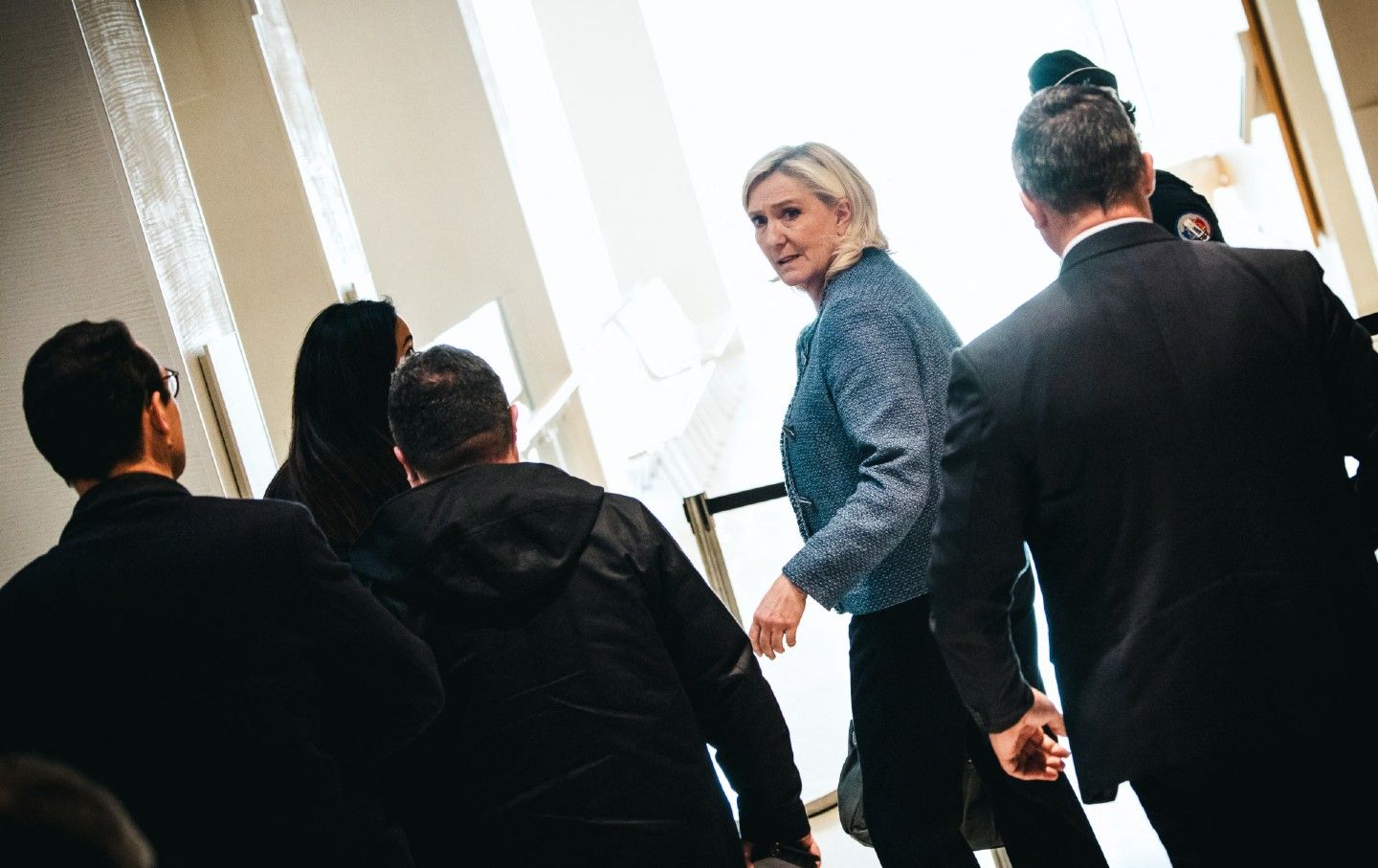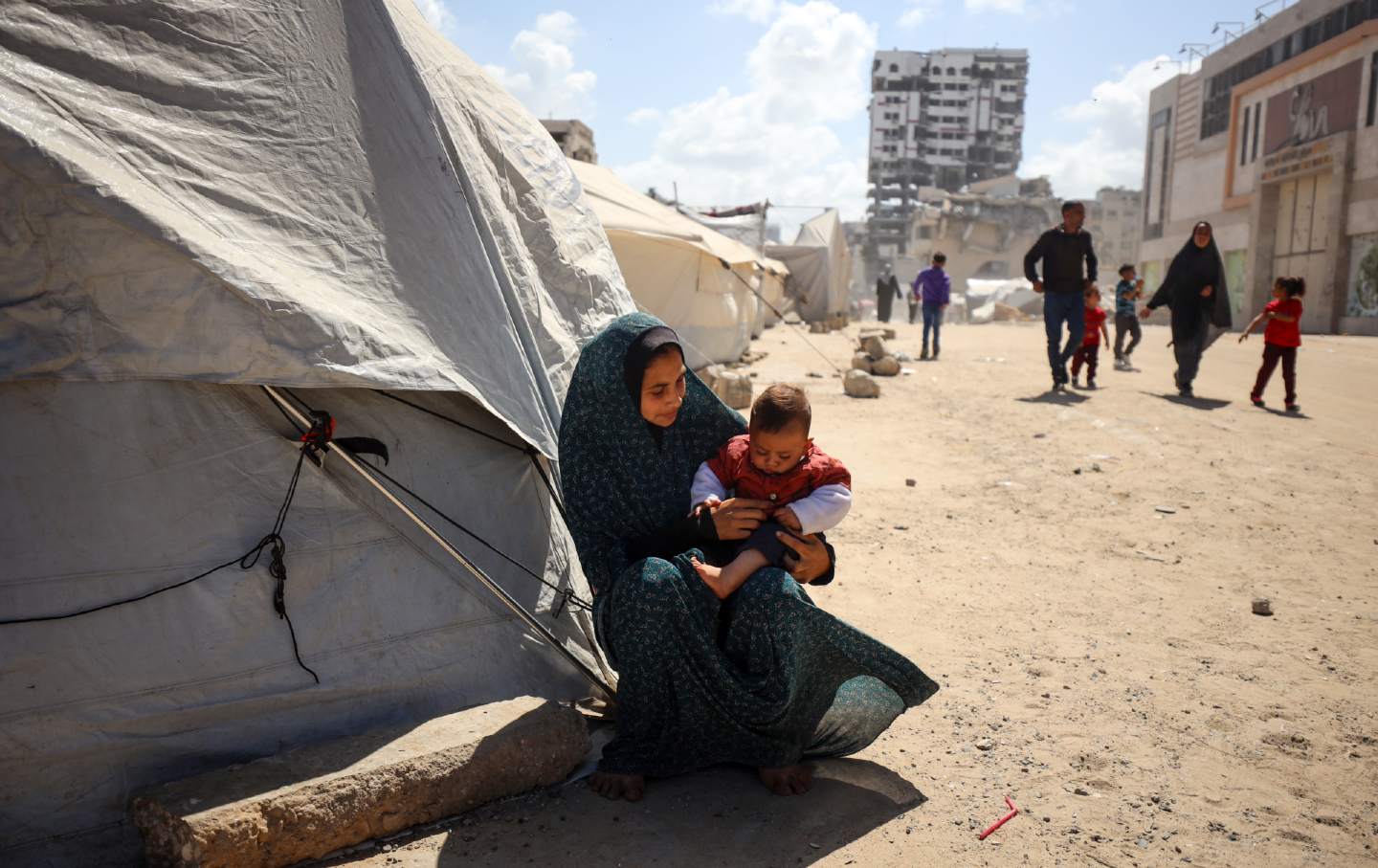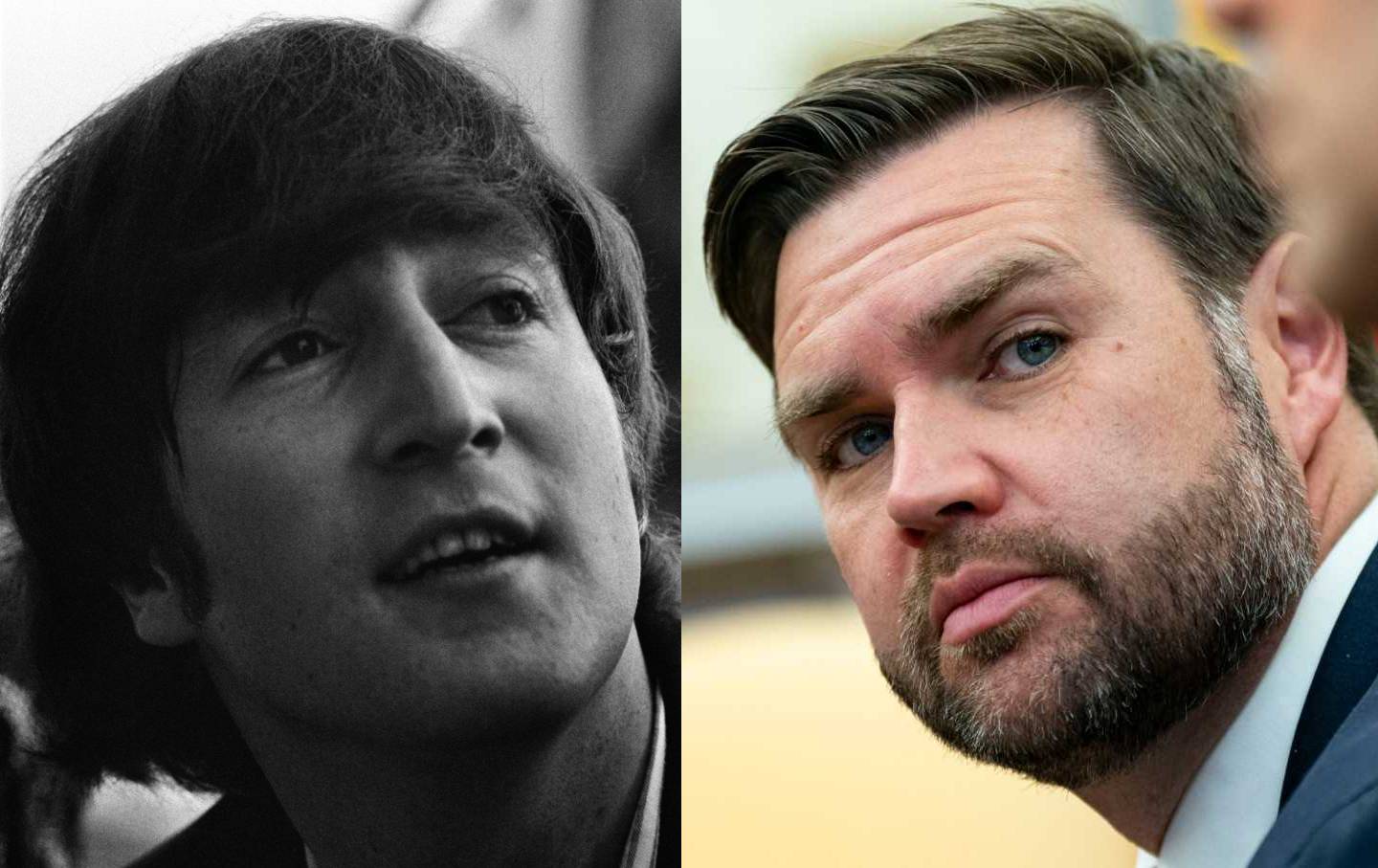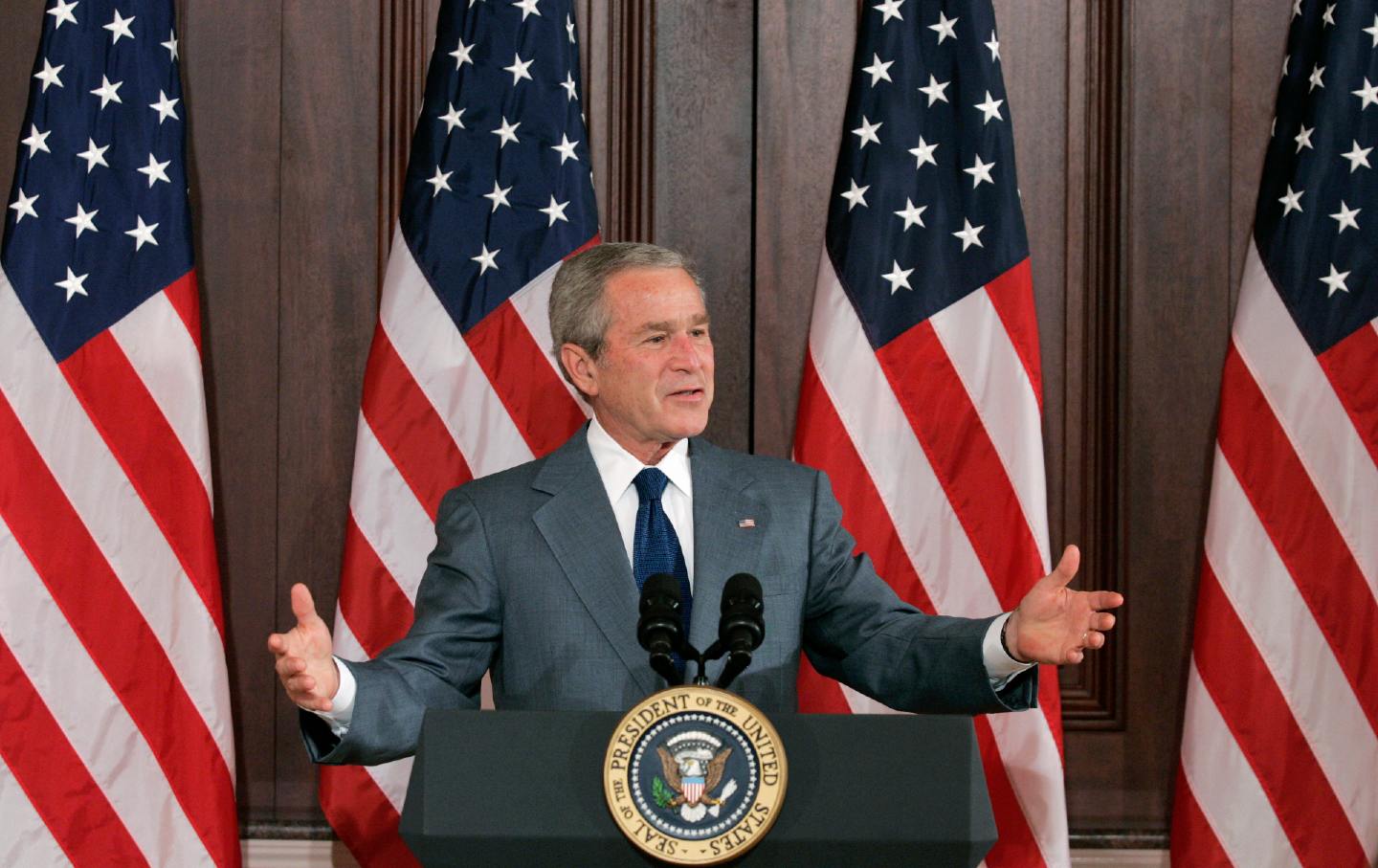April 1, 2025
A French court rules to bar Marine Le Pen from seeking office for five years.

Right-wing leader Marine Le Pen leaves the courtroom early, sentenced to imprisonment and disqualified from holding office for embezzlement charges.
(Amaury Cornu / Hans Lucas via AFP)
Marine Le Pen will not be a candidate in France’s 2027 presidential elections. For now, at least, that is the letter of a major court ruling against the longtime leader of the French far right, who was found guilty on March 31 of sprawling embezzlement charges and sentenced to a five-year ban on seeking elected office.
Le Pen and the Rassemblement National, the far-right force that she took over from her father in 2011, was found to have conspired to syphon off public funds through fake employment claims at the parliament of the European Union in Strasbourg.
The scope of the ruling against Le Pen and her allies is vast. The party’s main figurehead will likewise face a €100,000 fine and a four-year suspended prison sentence, including two years with an electronic tag. The far-right force was likewise fixed with a €2 million fine and ordered to pay over €4 million in damages to the European parliament. Over a dozen of Le Pen’s current and former associates, including MPs in the national and European parliament and other elected officials, were also declared guilty. They are facing an array of penalties including suspended prison time, fines, and ineligibility sentences.
The sentence looks primed to set off a firestorm on the far right, both in France and across Europe. A visibly stunned Marine Le Pen hurried through swaths of reporters as she stormed out of the Paris courthouse at midday and reportedly stammered “unbelievable” before making her way to party headquarters in west Paris.
A 2016 law made electoral ineligibility into an automatic sentencing requirement in cases involving the embezzlement of public funds by elected officials. In total, the EU parliament estimated the scale of funds stolen by the Le Pen and her allies at nearly €7 million between the mid 2000s and mid 2010s.
Le Pen is expected to file an immediate appeal, which will issue a stay on her house arrest. Her ban on seeking office will not be interrupted during further proceedings, however, meaning that she would be barred from participating in elections through the duration of an appeal.
That timeline could preclude her from running in the presidential elections scheduled for 2027, a contest for which Le Pen has increasingly been viewed as a favorite and that would mark her fourth bid for the presidency. An MP in France’s National Assembly since 2017, Le Pen will not be forced to cut short her current parliamentary mandate, although she will be required to give up her council seat in the Pas-de-Calais department in northern France. If she is unable to run in 2027, it would likely mark the first time since 1981 that a member of the Le Pen family has not been a candidate in a French presidential election.
To judge by the opening reactions, the Rassemblement National is prepared to mount a scorched-earth campaign over the guilty verdict. Decrying the judgment as a politicized sentence that has the courts intervening to sideline a key figure of the political opposition, Le Pen and her allies look set to borrow from the attacks against the American justice system by Donald Trump and MAGA Republicans.
“Today, it’s not just Marine Le Pen who has been unjustly sentenced: French democracy itself is facing execution,” Jordan Bardella, the Rassemblement National’s official president, posted to X shortly after the ruling, using the hashtag #ISupportMarine. Though Le Pen remains the party’s standard-bearer, Bardella became the far-right party’s official leader in 2022.
Since then, Bardella has steadily increased his national profile and was the force’s presumptive prime minister pick in the snap elections that followed last summer’s tumultuous dissolution of parliament by President Emmanuel Macron. With Le Pen embroiled in the trial since last fall, the 29-year-old Bardella has likewise been grooming himself to take over the reins for a presidential bid, pending an eventual guilty verdict and appeal.
The Rassemblement National’s counterparts in Europe also rallied to the defense of their gallic ally. Matteo Salvini took to X to condemn what he called a “declaration of war by Brussels.” (The ruling against Le Pen comes only months after a late 2024 Romanian Supreme Court decision to cancel the results of that country’s presidential election and bar the far-right contender who emerged in first place from a rerun.) “Je suis Marine!” wrote Hungarian prime minister Viktor Orbán out of solidarity.
Le Pen, for her part, doesn’t appear to be backing down either. Speaking on TF1 in the leading Monday night news slot, she skewered the ruling as a “political decision” and an attack on the “rule of law.”
Coming amid an already busy docket of national corruption cases, Monday’s ruling against the Rassemblement National will feed the growing chorus of criticism against the judiciary heard across the French right. Former right-wing president Nicolas Sarkozy is currently standing trial over notorious allegations of campaign finance violations stretching back to 2007, in a scheme involving then–Libyan dictator Moammar El-Gadhafi. Last Thursday, state prosecutors requested a seven-year prison sentence and a 300,000 euros fine against the former president—and five years of electoral ineligibility.
Right-wingers have likewise developed a staunch critique of liberal protections in the French Constitution and various European statutes. In early 2024, the Constitutional Court’s decision to censure some of the harshest measures of an anti-immigration law approved by parliament saw a groundswell of conservative anger over alleged juridical overreach. In the French right’s war on crime, it’s also not uncommon to hear gripes against the supposed “leniency” of judges and state attorneys in their treatment of low-level criminality.
“Who can stop the power of judges?” Vincent Tremolet de Villers, an editorialist with conservative daily Le Figaro, said of the Sarkozy trial in his March 28 segment on the hard-right radio network Europe-1.
That’s a sentiment and script that will likely now play on loop as long as the verdict against Le Pen stands.
Reactions elsewhere on the political spectrum were varied, however, as forces stake out positions on a ruling that could well redraw France’s already chaotic political battlelines.
Members of the centrist governing coalition sought to downplay and defend Monday’s decision. “How high in the polls do you need to be to think you’re above the law? We are citizens like everyone else,” Macronist MEP Prisca Thevenot told reporters.
Popular
“swipe left below to view more authors”Swipe →
Others have expressed grumblings. Before rejoining the government ranks as justice minister this winter, Gérald Darmanin took aim at the sentencing requirements issued last November and complained that “it would be deeply shocking if Le Pen were deemed ineligible.” In second-hand comments to Le Parisien on Monday afternoon, people close to prime minister François Bayrou let it be known that the head of government “was troubled by the sentence” against the far-right leader.
Among the parties of the left-wing New Popular Front, responses fell along the alliance’s internal divisions. The center-left Parti Socialiste called all parties to “respect the independence of the justice system and the rule of law.” While it accepted the court ruling in its communiqué, leftist force La France Insoumise nonetheless insinuated that “it never has had recourse to a tribunal to get rid of the Rassemblement National.”
Beyond a conventional court appeal, the Rassemblement National is also expected to request the intervention of Constitutional Council, which determines the constitutionality of French laws. This winter, the Rassemblement National’s delegation in the National Assembly—where Le Pen holds sway as the party’s caucus leader—opted to abstain in the vote over the nomination of Macron-ally Richard Ferrand to head the Constitutional Council, allowing the controversial candidate to clear a tight vote. That move appeared to many as an interested play to curry favor in the event that the party needed to challenge the constitutionality of an illegibility verdict targeting Le Pen.
On Monday night, she appeared to rule out seeking a pardon as long as the case faces a chance of winning a legal repeal.
Then full legal and political litigation of the ruling against Le Pen will likely take years to play out. In the eyes of much of the French right, the 2027 presidential election began this Monday morning, turning the race for the highest office in France into a referendum on the country’s democracy and the separation of powers. That’s a worrying prospect in its own right: As polls released in the days before the ruling again make clear, a clear plurality of French voters support Le Pen. What that electorate will now see is the felling of their political champion in a pseudo-juridical hit. The facts of the case may say something else entirely. But in France’s slow-brewing legitimacy crisis, that will do little to prevent the affair from becoming a combustible source of resentment.
In the short term too, Le Pen’s sentencing could alter the calculus in France’s hung parliament, where a minority centrist-conservative coalition has had a fragile hold on power since last September. The Rassemblement National and its allies provided the swing votes needed to bring down the government of conservative prime minister Michel Barnier in December. In early 2025, however, it offered its tacit support for François Bayrou, who heads a minority government composed of the same parties that backed behind his predecessor.
The Rassemblement National had tactical reasons for refusing to no-confidence Bayrou in February, namely its interest in not being perceived as a factor in the country’s political instability. But many have speculated that Bayrou’s willingness to air criticism of the requested ineligibility sentence played a role too. Acquitted for similar fictive employment charges in February 2024, Bayrou argued last November that an ineligibility ruling against Le Pen would lead many people to “believe that something is distorting our democratic system.”
If or rather when Bayrou faces another no-confidence vote, the far right could now see an advantage in opting to scuttle the premier. “My personal fate will have no incidence on our ability to defend the French people and take the necessary decisions to defend them,” Le Pen seemed to threaten last week.
In the long -run, it could be the far-right party’s attempt at achieving its political “normalization”—the strategic hallmark of the Marine Le Pen era—that gets drawn into question. What it will try to sell Monday’s ruling as is a politicized intervention from biased judges and other lurid forces operating from the deep reaches of the governing establishment. In other words, it’s a casus belli. And a wake-up call for the country’s not-too-buried authoritarian traditions.
More from The Nation

The country has proven itself incapable of not abducting and imprisoning people entering it—boycotting US matches avoids putting teams, their families, and fans in danger.

As Ramadan comes to an end, a mother prays that she can safely break her fast with their children, with sufficient food and clean water, without fear of being torn to pieces by bo…

The vice president has doubts about the Yemen war, but will Democrats find the courage to oppose it? The GOP’s fractures offer a chance to push for an anti-interventionist agenda….

The assault and arrest of Ballal Hamdan is horrendous, but the framing of the incident reproduces the idea that some lives are more worthy of defense than others.



